Tixtor Surname Ancestry ResultsOur indexes 1000-1999 include entries for the spelling 'tixtor'. In the period you have requested, we have the following 7 records (displaying 1 to 7): Buy all | | | Get all 7 records to view, to save and print for £30.00 |
These sample scans are from the original record. You will get scans of the full pages or articles where the surname you searched for has been found. Your web browser may prevent the sample windows from opening; in this case please change your browser settings to allow pop-up windows from this site. Grantees of royal lands and pardons
(1176-1177)
The Great Rolls of the Pipe are the central record of the crown compiling returns of income and expenditure from the sheriffs and farmers of the various English counties or shires. This is the oldest series of public records, and the earliest surviving instances of many surnames are found in the Pipe Rolls. This is the roll for the 23rd year of the reign of king Henry II, that is, accounting for the year from Michaelmas 1176 to Michaelmas 1177. Most (but not all) of the entries in which names appear relate to payments for grants of land and fines or pardons. The large number of payments of fines for forest transgressions has been interpreted as a form of compounding for pardons by those who had rebelled during the recent years of unrest. There is a separate return in each year for each shire, the name of the shire being here printed at the top of each page. Wales was still independent, in separate kingdoms, at this period, and is not included, except for 'Herefordshire in Wales'. TIXTOR. Cost: £4.00.  | Sample scan, click to enlarge
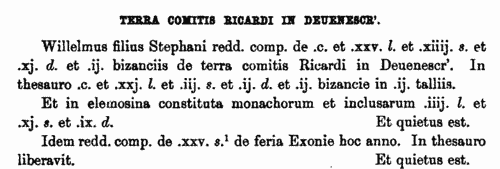
| Pleas of the Forest in Huntingdonshire
(1255)
Pleas of the forest in the county of Huntingdon, heard in the quindene of Holy Trinity in the 39th year of the reign of king Henry III, 6 June 1255, recorded in Public Record Office Forest Proceedings, Treasury of Receipt, No. 41, Roll 6, were selected, transcribed (the Latin extended) and translated by G. J. Turner and published by the Selden Society in 1901. The text and translation are printed on facing pages.TIXTOR. Cost: £4.00.  | Sample scan, click to enlarge

| Worcestershire Inhabitants
(1280)
The Worcestershire Lay Subsidy roll of about 1280 lists lay inhabitants of each township of the shire and of each ward of the city of Worcester, with the amount of tax payable by each. Latin.TIXTOR. Cost: £4.00.  | Sample scan, click to enlarge
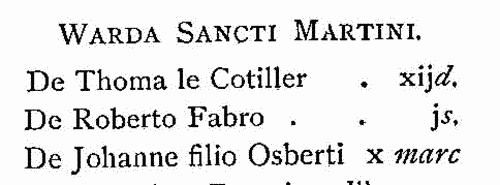
| Gidding Court Rolls
(1290)
Among the Huntingdonshire possessions of Ramsey abbey was the manor of Gidding. In the Augmentation Office Court Rolls in the Public Record Office, a roll of five rotulets (Portf. 34, No. 46) includes a record of the proceedings at Gidding view of frankpledge 28 November 1290. These were transcribed by F. W. Maitland, extending the Latin but retaining the spelling of the proper names, and printed with a facing English translation in 1889. In many cases the surnames were also Englished, but we have reindexed the text on the original forms alone.
TIXTOR. Cost: £4.00.  | Sample scan, click to enlarge

| Yorkshire Inquisitions
(1275-1295)
Inquisitions post mortem are inquiries as to the real estate and heir of each person holding in capite or in chief, i. e. directly, from the Crown, or whose estates had been escheated or were in ward. The age and relationship of the heir are usually recorded. Inquisitions ad quod damnum enquired as to any activities (including maladministration by local officials) that had resulted in any material loss to the Crown. Proofs of age are inquiries into the precise date of birth of an heir, usually involving local inhabitants recalling those circumstances which fixed that date in their mind. Yorkshire inquisitions for this period were edited by William Brown for the Yorkshire Archaeological Society, and printed in 1898. This index covers all names mentioned, including jurors, tenants, &c. TIXTOR. Cost: £4.00.  | Sample scan, click to enlarge
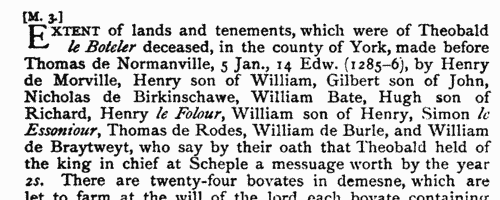
| Inhabitants of Yorkshire
(1297)
Taxation roll of the lay (non-clergy) inhabitants of Yorkshire from the 25th year of the reign of king Edward I. LatinTIXTOR. Cost: £6.00.  | Sample scan, click to enlarge
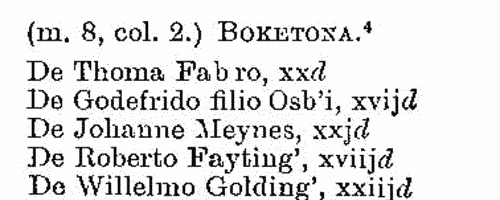
| Inhabitants of Norwich
(1288-1391)
Among the documents preserved in the record room of the Guildhall in the city of Norwich were 13 rolls connected with the leet courts in the city during the 13th and 14th centuries while the frankpledge system on which they were based was still in full operation. William Hudson, vicar of St Peter Permountergate in the city, prepared a copy of the earliest of these, from 1288, and extracts from the leet rolls of 1289, 1290, 1291, 1293, 1296, 1300, c1307, 1313, 1375 and 1391, and from an account of amercements in 1364, a tithing roll of Mancroft leet of 1311, and inquisitions before the bailiffs in 1350, and these were published by the Selden Society in 1892, with an English translation facing the extended Latin text. In 1288 there were four leets in the city - Conesford (North Conesford, South Conesford and Berstrete subleets), Manecroft (St Stephen, St Peter de Manecroft), Wymer or Westwyk (St Giles, St Gregory, St Andrew and St George), and Over the Water (St Michael and St Clement. Each leet had separate courts and separate records within the rolls. Hudson lists the main categories of items recorded as: murder, violent death, nuisances, weights, unwholesome food, larceny, assaults, hue and cry, being out of tithing, non-attendance at leet, purprestures, forestalling, unlawful trading, craft gilds, fraudulent work, and impleading in the Court Christian. TIXTOR. Cost: £4.00.  | Sample scan, click to enlarge
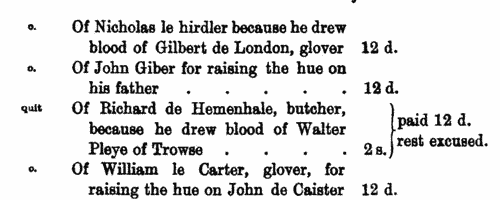
|
Research your ancestry, family history, genealogy and one-name study by direct access to original records and archives indexed by surname.
|









